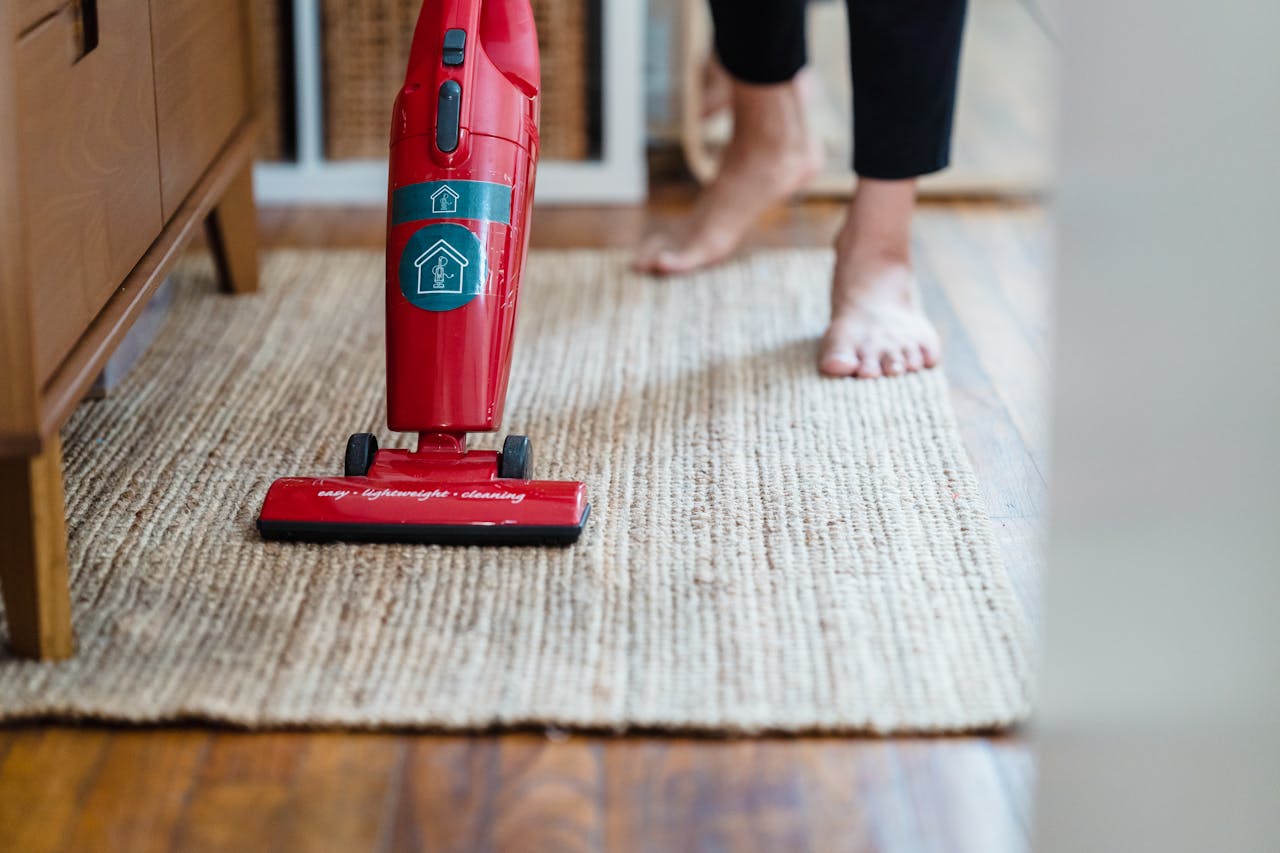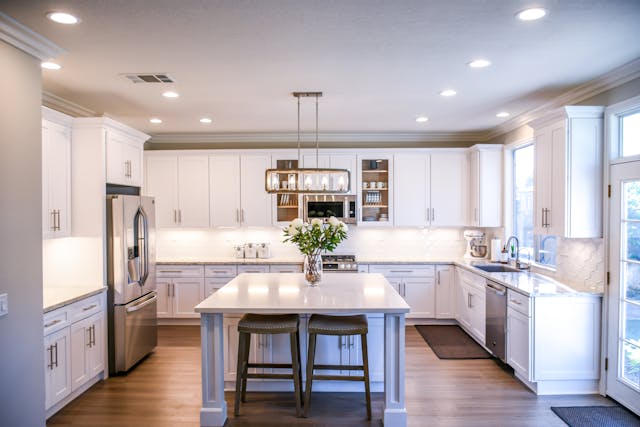
- Regular cleaning routines maintain cleanliness and remove allergens for a healthy living space.
- Proper ventilation and air quality control reduce indoor pollutants, enhancing respiratory health.
- Decluttering and organizing minimize stress, improve mental clarity, and optimize functionality.
- Healthy eating and cooking practices impact cleanliness and air quality, promoting overall health.
- Creating a relaxing atmosphere fosters tranquility, comfort, and a sense of well-being in the home.
In today’s fast-paced world, people’s homes serve as sanctuaries of comfort and refuge. However, maintaining a clean and comfortable living space is essential for both physical health and mental well-being. This article explores five practical tips to help you achieve just that. From establishing regular cleaning routines to improving ventilation and air quality, these strategies will transform your home into a haven of cleanliness and tranquility. By incorporating these habits into your daily life, you’ll enhance the aesthetics of your living space and create an environment conducive to relaxation, productivity, and overall happiness.
Tip 1: Regular Cleaning Routines
Regular cleaning routines are essential for maintaining a clean and healthy living space. Dust, dirt, and allergens can accumulate quickly, leading to respiratory issues and discomfort. By implementing a consistent cleaning schedule, you can effectively remove these pollutants and create a more comfortable environment for yourself and your family.
Preferences and Lifestyle
To begin, consider your individual preferences and lifestyle when creating a cleaning schedule. Some people may prefer to dedicate specific days to cleaning tasks, while others may prefer to tackle small tasks each day. Find a routine that works best for you and stick to it to ensure consistent cleanliness in your home.
Specific Areas
When cleaning, it’s essential to focus on areas that accumulate the most dirt and germs. High-touch surfaces such as doorknobs, light switches, and countertops should be cleaned and disinfected regularly to prevent the spread of germs. Additionally, floors should be swept, vacuumed, or mopped to remove dirt and debris. In the bathroom, areas prone to moisture, such as showers and sinks, should be thoroughly cleaned to prevent the growth of mold and mildew.
Work on Plumbing
You should work with a reputable company offering reliable plumbing services. Plumbing systems are essential for smooth water flow in and out of your property. Any issues with your plumbing can lead to inconvenience, water damage, and potential health hazards if not addressed promptly and effectively.
Tip 2: Proper Ventilation and Air Quality Control
Proper ventilation and air quality control are crucial in creating a healthy and comfortable indoor environment. Adequate ventilation is essential for reducing indoor air pollutants, which can negatively impact respiratory health and overall well-being. Poor ventilation can lead to the buildup of harmful contaminants such as volatile organic compounds (VOCs), allergens, and mold spores, contributing to indoor air pollution.
Improve Ventilation
To improve ventilation, consider simple yet effective measures such as opening windows and using exhaust fans. Opening windows allows fresh air to circulate throughout the space, flushing out stagnant air and reducing the concentration of indoor pollutants. Also, exhaust fans help remove moisture, odors, and contaminants from areas such as kitchens and bathrooms, where indoor air quality may be compromised.
Indoor Air Quality
In addition to improving ventilation, there are various strategies for maintaining indoor air quality. Air purifiers are highly effective at removing airborne pollutants, including dust, pollen, and pet dander, from the air. Investing in a high-quality air purifier with a HEPA filter can significantly improve indoor air quality, especially for individuals with allergies or respiratory conditions.
Natural Air Purifier
Furthermore, houseplants can serve as natural air purifiers, filtering out toxins and pollutants from the air through a process known as phytoremediation. Some plants, including snake plants and spider plants, are particularly effective at removing common indoor pollutants like trichloroethylene and benzene.
Tip 3: Decluttering and Organizing
Decluttering and organizing your living space is more than tidying up—it’s a powerful tool for enhancing mental clarity, reducing stress, and creating a more functional and enjoyable environment. The benefits of decluttering extend beyond simply having a cleaner home; it can positively impact your overall well-being.
Remove Physical Obstacles and Distractions
A cluttered environment can lead to feelings of overwhelm, anxiety, and even depression. Research suggests excessive clutter can contribute to elevated stress levels and hinder productivity. By decluttering, you remove physical obstacles and distractions, allowing for greater mental clarity and focus.
Systematic Decluttering
When embarking on a decluttering journey, it’s essential to systematically tackle different areas of the home. Start by focusing on high-traffic areas such as closets, countertops, and storage spaces. Sort through belongings, identifying items to keep, donate, or discard. Storage solutions such as bins, baskets, and shelves are used to organize belongings and maximize space.
Regular Organization
Developing a regular organization routine is key to preventing clutter from accumulating again. Set aside time each week to tidy up and return items to their designated places. Establishing daily habits, such as making the bed in the morning or clearing kitchen countertops before bed, can help maintain a clutter-free environment.
Tip 4: Healthy Eating and Cooking Practices
Healthy eating and cooking practices not only contribute to your physical well-being but also impact your home’s cleanliness and air quality. Various pollutants can be released into the air when cooking, affecting indoor air quality and cleanliness. Smoke, grease, and cooking odors can linger in the air and settle on surfaces, leading to grime buildup and potentially compromising indoor air quality.
Healthy Cooking Habits
To mitigate the impact of cooking on indoor air quality, practicing healthy cooking habits is essential. Natural cleaning products can help reduce exposure to harmful chemicals and toxins in the air. Additionally, proper ventilation is crucial while cooking to remove airborne pollutants and prevent them from accumulating in your home. Utilize exhaust fans or open windows to allow fresh air to circulate and expel cooking odors and contaminants.
Clean Kitchen Environment
Furthermore, maintaining a clean kitchen environment is essential for preventing foodborne illnesses and promoting overall health and safety. Proper sanitation practices, such as washing hands and surfaces regularly, can help reduce the risk of cross-contamination and foodborne pathogens. Clean countertops, sinks, and appliances regularly to remove food residue and prevent bacterial growth.
Tip 5: Creating a Relaxing and Comfortable Atmosphere
Creating a relaxing and comfortable atmosphere in your home is essential for promoting overall well-being and enhancing quality of life. Your living space should serve as a sanctuary where you can unwind, recharge, and rejuvenate after a long day. Creating a cozy and inviting environment can cultivate a sense of peace and tranquility within your home.
Comfortable Living Space
The importance of a comfortable living space cannot be overstated. A well-designed and thoughtfully decorated home can positively impact your mood, mental health, and happiness. When your surroundings are aesthetically pleasing and conducive to relaxation, you are likelier to feel calm, content, and at ease.
Soft Furnishing
Consider incorporating soft furnishings such as plush blankets, fluffy pillows, and cozy area rugs to create a cozy atmosphere. These elements add warmth and texture to your space, making it more inviting and comfortable. Additionally, incorporating natural elements such as plants, wood accents, and natural light can bring a sense of serenity and connection to the outdoors.
Healthy Balance in Life
Managing stress and promoting relaxation through home decor and ambiance is essential for maintaining a healthy balance in your life. Choose decor and colors that evoke feelings of tranquility and calmness, such as soft neutrals, soothing blues, and earthy tones. Incorporate elements that appeal to your senses, such as scented candles, calming music, and comfortable seating areas where you can unwind and decompress.
In conclusion, maintaining a clean and comfortable living space is essential for promoting physical and mental health. By implementing the five tips outlined in this article—regular cleaning routines, proper ventilation, and air quality control, decluttering and organizing, healthy eating and cooking practices, and creating a relaxing atmosphere—you can transform your home into a sanctuary of cleanliness, comfort, and tranquility. These simple yet effective strategies enhance the aesthetics of your living space and contribute to a healthier, happier lifestyle for you and your loved ones. Embrace these habits to enjoy the benefits of a clean and comfortable home for years.






